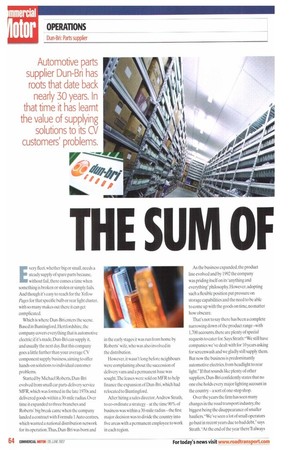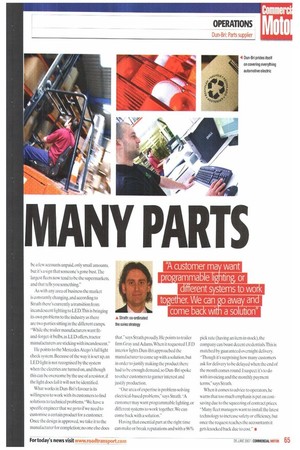THE SUM OF MANI! PARTS
Page 64

Page 65

If you've noticed an error in this article please click here to report it so we can fix it.
Every fleet, whether big or small, needs a steady supply of spare parts because, without fail, there comes a time when something is broken or stolen or simply fail& And though it's easy to reach for the Yellow Pages for that specific bulb or rear light cluster, with so many makes out there it can get complicated.
Which is where Dun-Bri enters the scene. Based in Buntingford, Hertfordshire, the company covers everything that is automotive electric; if it's made, Dun-Bri can supply it, and usually the next day. But this company goes a little further than your average CV component supply business, aiming to offer hands-on solutions to individual customer problems.
Started by Michael Roberts, Dun-Bri evolved from small car parts delivery service MFR, which was formed in the late 1970s and delivered goods within a 30-mile radius. Over time it expanded to three branches and Roberts' big break came when the company landed a contract with Formula 1 Auto centres, which wanted a national distribution network for its operation.Th us, Dun-Bri was born and in the early stages it was run from home by Roberts' wife, who was also involved in the distribution.
However, it wasn't long before neighbours were complaining about the succession of delivery vans and a permanent base was sought.The leases were sold on MFR to help finance the expansion of Dun-Bri, which had relocated to Buntingford.
After hiring a sales director,Andrew Strath, to co-ordinate a strategy —at the time 90% of business was within a 30-mile radius— the first major decision was to divide the country into five areas with a permanent employee to work in each region. As the business expanded, the product line evolved and by 1992 the company was priding itself on its 'anything and everything' philosophy. However, adopting such a flexible position put pressure on storage capabilities and the need to be able to come up with the goods on time, no matter how obscure.
That's not to say there has been a complete narrowing down of the product range —with 1,700 accounts, there are plenty of special requests to cater for. Says Strath:"We still have companies we've dealt with for 10 years asking for screenwash and we gladly still supply them. But now the business is predominantly automotive electrics, from headlight to rear light." If that sounds like plenty of other suppliers. Dun-Bri confidently states that no one else holds every major lighting account in the country — a sort of one-stop shop.
Over the years the firm has seen many changes in the road transport industry, the biggest being the disappearance of smaller hauliers."We've seen a lot of small operators go bust in recent years due to bad debt,says Strath."At the end of the year there'll always be a few accounts unpaid, only small amounts, but it's a sign that someone's gone bust.The largest fleets now tend to be the supermarkets, and that tells you something."
As with any area of business the market is constantly changing, and according to Strath there's currently a transition from incandescent lighting to LED:This is bringing its own problems to the industry as there are two parties sitting in the different camps. "While the trailer manufacturers want fitand-forget-it bulbs, as LED offers, tractor manufacturers are sticking with incandescent.
He points to the Mercedes Atego's full light check system. Because of the way it is set up, an LED light is not recognised by the system when the electrics are turned on, and though this can be overcome by the use of a resistor, if the light does fail it will not be identified.
What works in Dun-Bri's favour is its willingness to work with its customers to find solutions to technical problems. "We have a specific engineer that we go to if we need to customise a certain product for a customer. Once the design is approved, we take it to the manufacturer for completion; no one else does that,says Strath proudly. He points to trailer firm Gray and Adams. When it requested LED interior lights Dun-Bri approached the manufacturer to come up with a solution, but in order to justify making the product there had to he enough demand, so Dun-Bri spoke to other customers to garner interest and justify production.
"Our area of expertise is problem-solving electrical-based problems," says Strath. 'A customer may want programmable lighting, or different systems to work together. We can come back with a solution."
Having that essential part at the right time can make or break reputations and with a96% pick rate (having an item in stock),the company can boast decent credentials.This is matched by guaranteed overnight delivery. -Though it's surprising how many customers ask for delivery to be delayed when the end of the month comes round.! suspect it's to do with invoicing and the monthly payment terms," says Strath.
When it comes to advice to operators, he warns that too much emphasis is put on costsaving due to the squeezing of contract prices. "Many fleet managers want to install the latest technology to increase safety or efficiency, but once the request reaches the accountants it gets knocked back due to cost." •






























































































































































































